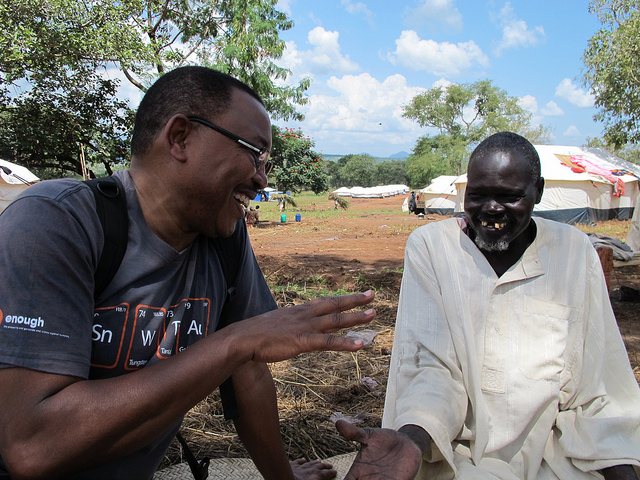
As a native of Darfur, what led you to leave the region in 1989?
Ismail: It’s a long story why I left in 1989. The main reason was that I knew when the Islamists took over [in a military coup of 1989] that Sudan was never going to be the same. I was one of very few people who said from day one that this coup was designed, executed, and financed by the Islamists. From that time, I knew I had to leave because my political views were definitely at odds with theirs. I do not agree with their ideology even though I’m a Muslim. I don’t want my country to be run by Islamic, or Sharia, law because I believe in the diversity of the country, and I believe that non-Muslim Sudanese have rights, as much as I do, in the country.
Have you returned at all since?
Ismail: This is a tricky question because the answer is both yes and no. I returned to certain parts at certain times, but if return is defined as going through Khartoum, then the answer is no.
Ten years after the conflict in Darfur began, there are still millions of people displaced, and state- sponsored atrocities persist in this troubled region. Why do you think this is the case?
Ismail: This is the case because the Darfuris and Darfur are not significant in the international community. We have seen interventions after Darfur, and they were amicably resolved. Take Libya, for instance. There was not only humanitarian intervention, but they got authorization from the Security Council for NATO and others to participate in freeing the Libyan people. We see there is a lot of work today to get the Syrians on the same track and free the Syrian people. I am not saying these are not important and significant achievements for humanity, but what I’m saying is that the people of Sudan deserve to be freed the same way that the Syrians and Libyans were freed. But I’m not calling for military intervention in Sudan—far from it.
For what are you calling?
Ismail: What I’m calling for is an intervention that is going to support the Sudanese themselves to get rid of this oppressive regime. There are so many ways we can support the Sudanese to do it on their own. The important thing for me is that there will be freedom for these people. And what follows is that we stay the course and try to charter a clear way for the governments that are going to come and replace these oppressive regimes. We know how to deal with failed states and states after conflicts. The international community must think first of freeing the people and charting a way for governments to become more democratic, more observant of human rights, and more inclined to work towards peace and reconciliation within their borders and beyond.
How do you think the Darfur conflict relates to the other internal Sudan conflicts happening in South Kordofan and Blue Nile states?
Ismail: All my life I have been saying that this is the crisis of Sudan in Darfur. Darfur is a manifestation of the failure of the entire state. It is not an isolated incident. It is part of the failure of the whole regime: the failure of a government to control its borders, to do what is right for its people, and to deliver what a government is supposed to deliver to its people. If a sovereign government does not deliver security and necessities to you, then it is not a government [by definition]. For the Sudanese government to stay in power they have to be in war constantly and consistently with many parts of the country: Darfur, the Blue Nile, Nuba Mountains, South Sudan that separated and became its own country, the people of the North, and the people of the East.
How does the Responsibility to Protect doctrine apply in Darfur? You’ve mentioned a little bit about what the international community can and should do, but can you expand on that?
Ismail: Yes, the Responsibility to Protect, or R2P, has certain pillars, and I believe that all of them apply to the case of Sudan, specifically in Darfur where genocide has taken place and places like the Nuba Mountains where ethnic cleansing has taken place. This will be a dark spot in the consciences of the world when we write history in the near future. I think the international community had different ways under R2P doctrine to deal with these situations: sanctioned regimes, diplomatic pressures, and humanitarian interventions. This is part of what R2P can do to save people. Will the world do this? Are we going to see, in the second Obama administration, a revisiting of policy adopted for Sudan? We need to adopt new policies and make them multilateral in the sense that we should bring the Europeans on board. Now the Africans are ready to work, more now than ever, with the international community to help with the situation in Sudan.
The conflict in Darfur began 10 years ago. To commemorate the anniversary—remember the lives lost, acknowledge the continuing struggle of the displaced, and recognize the ongoing effort to establish justice and find peace amid ongoing conflict—Enough and its partners will mark 10 days of activism. Please visit Darfur10.org and share the special site with your friends. Read the rest of the blog posts in this 10-day series.
Photo: Omer Ismail interviews a refugee displaced from Blue Nile (Enough / Amanda Hsiao)

